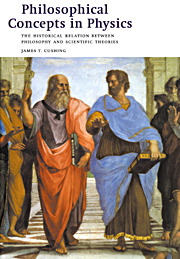 Philosophical Concepts in Physics
Philosophical Concepts in Physics Book contents
- Frontmatter
- Contents
- Preface
- Copyright acknowledgments
- PART I The scientific enterprise
- PART II Ancient and modern models of the universe
- PART III The Newtonian universe
- PART IV A perspective
- PART V Mechanical versus electrodynamical world views
- PART VI The theory of relativity
- PART VII The quantum world and the completeness of quantum mechanics
- PART VIII Some philosophical lessons from quantum mechanics
- PART IX A retrospective
- Notes
- General references
- Bibliography
- Author index
- Subject index
PART I - The scientific enterprise
Published online by Cambridge University Press: 05 June 2012
- Frontmatter
- Contents
- Preface
- Copyright acknowledgments
- PART I The scientific enterprise
- PART II Ancient and modern models of the universe
- PART III The Newtonian universe
- PART IV A perspective
- PART V Mechanical versus electrodynamical world views
- PART VI The theory of relativity
- PART VII The quantum world and the completeness of quantum mechanics
- PART VIII Some philosophical lessons from quantum mechanics
- PART IX A retrospective
- Notes
- General references
- Bibliography
- Author index
- Subject index
Summary
I hold that in all cases of inductive inference we must invent hypotheses, until we fall upon some hypothesis which yields deductive results in accordance with experience. Such accordance renders the chosen hypothesis more or less probable, and we may then deduce, with some degree of likelihood, the nature of our future experience, on the assumption that no arbitrary change takes place in the conditions of nature.
William Jevons, The Principles of Science: A Treatise on Logic and Scientific Method
Pure logical thinking cannot yield us any knowledge of the empirical world; all knowledge of reality starts from experience and ends in it. Propositions arrived at by purely logical means are completely empty as regards reality. Because Galileo saw this, and particularly because he drummed it into the scientific world, he is the father of modern physics – indeed, of modern science altogether.
A complete system of theoretical physics is made up of concepts, fundamental laws which are supposed to be valid for those concepts and conclusions to be reached by logical deduction. It is these conclusions which must correspond with our separate experiences.
The structure of the system is the work of reason; the empirical contents and their mutual relations must find their representation in the conclusions of the theory. In the possibility of such a representation lie the sole value and justification of the whole system, and especially of the concepts and fundamental principles which underlie i t … [T]hese latter are free inventions of the human intellect, which cannot be justified… a priori.
- Type
- Chapter
- Information
- Philosophical Concepts in PhysicsThe Historical Relation between Philosophy and Scientific Theories, pp. 1 - 2Publisher: Cambridge University PressPrint publication year: 1998
